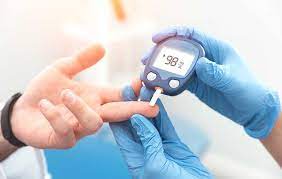Diabetes is a chronic disease
Diabetes is a chronic disease that occurs either when the pancreas does not produce enough insulin or when the body cannot effectively utilize the insulin produced. Insulin is a hormone that regulates blood glucose levels. A common consequence of uncontrolled diabetes is hyperglycemia - or elevated blood glucose (sugar) levels - which over time leads to serious damage to many body systems, especially the nervous system and blood vessels.
Symptoms of diabetes can come on suddenly. In type 2 diabetes, symptoms may be mild, and it may take many years before they become noticeable.
Typical symptoms of diabetes are:
severe thirst;
need to urinate more frequently than usual;
blurred vision;
increased fatigue;
unintentional weight loss.
Over time, diabetes can lead to damage to blood vessels in the heart, eyes and kidneys, as well as the nervous system.
People with diabetes are at higher risk for health problems including heart attacks, stroke, and kidney failure.
Diabetes can lead to permanent vision loss due to damage to the blood vessels in the eyes.
Type 1 diabetes (formerly insulin-dependent, juvenile or childhood diabetes), which is characterized by insufficient insulin production, requires the patient to take daily insulin injections. In 2017, there were 9 million people with type 1 diabetes; most lived in high-income countries. Currently, the cause of this type of diabetes is unknown and no preventive measures have been developed.
Type 2 diabetes affects how the body uses sugar (glucose) for energy. In this type of diabetes, the body cannot use insulin effectively, which can lead to high blood sugar levels in the absence of treatment.
Over time, type 2 diabetes can cause serious damage to the body, especially to the nervous system and blood vessels.
The development of type 2 diabetes is often preventable. Factors that contribute to the development of type 2 diabetes include being overweight, lack of exercise, and genetic factors.
To prevent the worst effects of type 2 diabetes, early diagnosis is important. The best way to detect diabetes early is to have regular checkups with your doctor and blood tests.
The symptoms of type 2 diabetes may be mild. They may only become noticeable after several years. Symptoms may be similar to those of type 1 diabetes, but are often less pronounced. As a result, the disease is often diagnosed several years after its onset, after complications have already appeared.
More than 95% of diabetics are people with type 2 diabetes. Type 2 diabetes was formerly called insulin-independent diabetes or adult-onset diabetes. Until recently, this type of diabetes was only seen in adults, but it is now increasingly seen in children as well.
Gestational diabetes is manifested by hyperglycemia with blood glucose values that are higher than normal but do not reach diagnostically significant for a diagnosis of diabetes. Gestational diabetes develops during pregnancy.
Women with this form of diabetes are at increased risk of complications during pregnancy and childbirth. These women, and possibly their children, are also at increased risk of developing type 2 diabetes in later life.
Most often, gestational diabetes is diagnosed during prenatal screening rather than by the patient's complaints.
In the early stages, diagnosis can be made with relatively inexpensive blood glucose testing. Patients with type 1 diabetes cannot live without insulin injections.
One of the most important ways to manage diabetes is to live a healthy lifestyle.
Some people with type 2 diabetes need to take medicines to regulate blood sugar levels. These may be insulin injections or other remedies. For example:
Metformin;
sulfonylureas;
sodium-glucose cotransporter inhibitors type 2 (iNGCT-2).
Along with medications to lower blood sugar levels, people with diabetes often need blood pressure medications and statins to reduce the risk of complications.
Additional medical care may be needed to manage the effects of diabetes:
foot care to treat ulcers;
Screening and treatment for kidney disease;
screening for retinopathy (causing blindness).
translated Ismoilov R.

